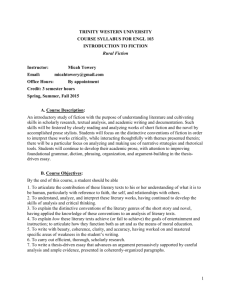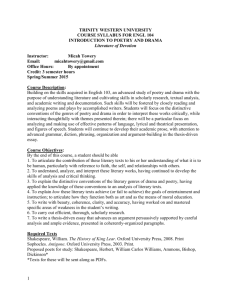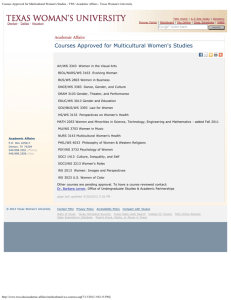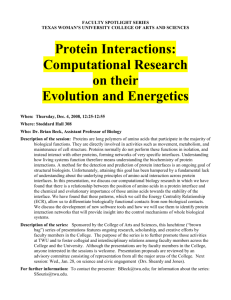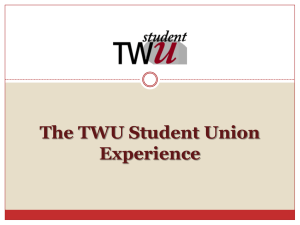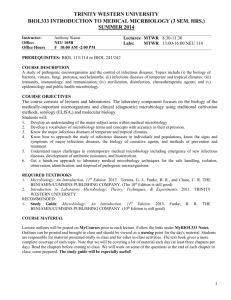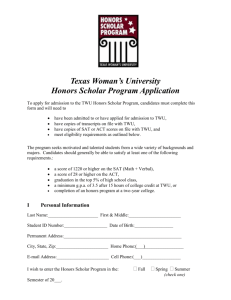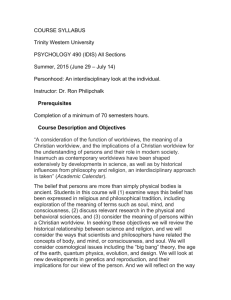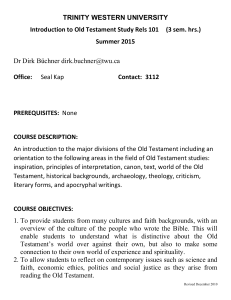Introduction to International Relations
advertisement
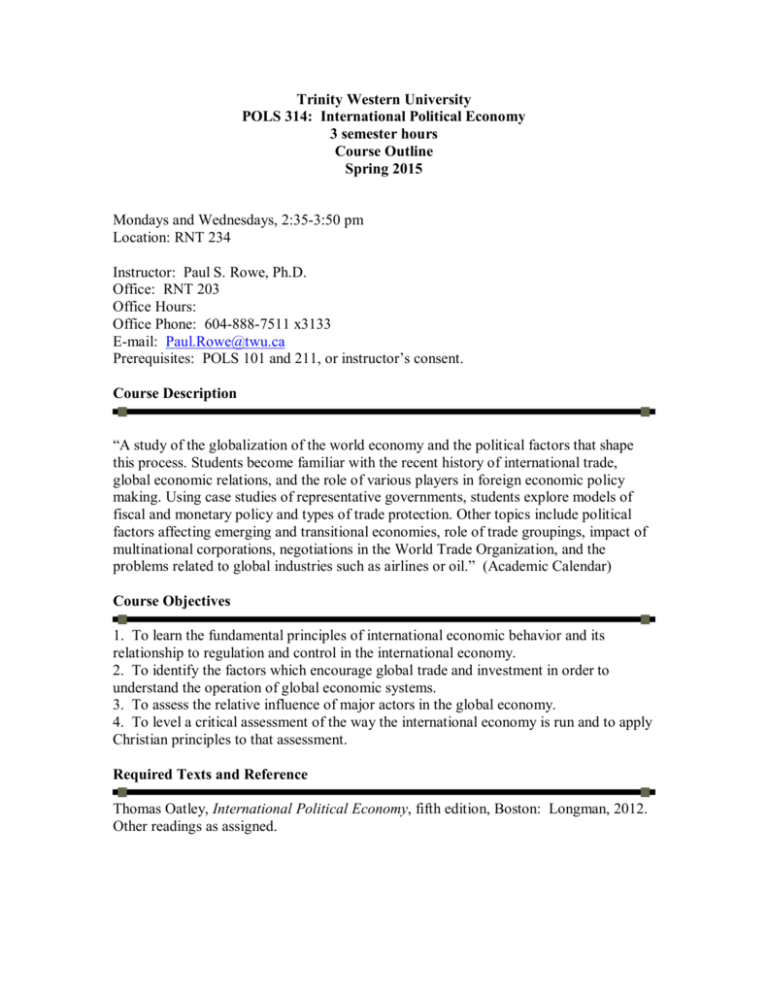
Trinity Western University POLS 314: International Political Economy 3 semester hours Course Outline Spring 2015 Mondays and Wednesdays, 2:35-3:50 pm Location: RNT 234 Instructor: Paul S. Rowe, Ph.D. Office: RNT 203 Office Hours: Office Phone: 604-888-7511 x3133 E-mail: Paul.Rowe@twu.ca Prerequisites: POLS 101 and 211, or instructor’s consent. Course Description “A study of the globalization of the world economy and the political factors that shape this process. Students become familiar with the recent history of international trade, global economic relations, and the role of various players in foreign economic policy making. Using case studies of representative governments, students explore models of fiscal and monetary policy and types of trade protection. Other topics include political factors affecting emerging and transitional economies, role of trade groupings, impact of multinational corporations, negotiations in the World Trade Organization, and the problems related to global industries such as airlines or oil.” (Academic Calendar) Course Objectives 1. To learn the fundamental principles of international economic behavior and its relationship to regulation and control in the international economy. 2. To identify the factors which encourage global trade and investment in order to understand the operation of global economic systems. 3. To assess the relative influence of major actors in the global economy. 4. To level a critical assessment of the way the international economy is run and to apply Christian principles to that assessment. Required Texts and Reference Thomas Oatley, International Political Economy, fifth edition, Boston: Longman, 2012. Other readings as assigned. Course Requirements Panel Mid-Term Research Paper Final Exam Participation 10% 20% 30% 30% 10% Panel – each student will be assigned to a panel that will engage and research a pertinent question in contemporary international political economy. Each of two panels of students will prepare a single class learning exercise or presentation that will help the class to explore answers to the question of the day. Each student will submit a single page answer that summarizes his or her response to the question in addition to the classroom learning exercise. The panel grade will depend in equal measures on the one-page summary and the success of the classroom exercise. Students should seek to address the question in class in a creative and thought-provoking manner. Panel #1 due date: 4 February 2015 Panel #2 due date: 23 March 2015 Mid-Term – will be held in-class on 18 February 2015 and will test students’ comprehension of the material covered up to that point. Research Paper – each student is required to submit a research paper of approximately 2500-3000 words that addresses a major issue in the global political economy. Every student is urged to consult with the professor in developing his or her research project. Due date for research paper: 16 March 2015 Here is a list of potential topics. Note: these are only suggestions! Assessment of NAFTA: Sectors that suffer and sectors that win. How well does the WTO dispute settlement mechanism work? Does the IMF work effectively and with justice? Currency Crises: the Mexican Peso Crisis, Asian Financial Crisis, the Euro Crisis Coordination by the international banking industry, Basel Group, etc., how well do these groups work? Currency manipulation, what does it mean and who is doing it? Argentina’s bold challenge to its creditors and the consequences Oil Politics: Venezuela, Iran, Saudi Arabia, etc. State Economic Foreign Policies: Canada, the US, etc. Chinese/American/etc. Trade Policy Tax Evasion and Tax Havens Latin American Regionalism, LAFTA, prospects for Latin American Free Trade Can ASEAN deepen its economic integration? Ethics of international sale of drugs--what should pharmaceuticals be required to do? Regulation and behavior in key industries: pharmaceuticals, air industry, software, auto industry Assessment of corporate social responsibility: transgressions, limits. Economic integration between Russia and its neighbours, expansion of the EU to the east/Ukraine The economics of illegal trafficking - Human, Drugs, Weapons. World Bank assessed: how can it be more helpful? Cancellation of poor country debts--how is it going? Impact of our biggest aid organizations - The Gates Foundation, World Vision Final Exam – will be held during the examination period in April and will cover all material in the course. Grading Policy – grading in this course will follow the university’s standard grading policy found in the academic calendar. Policy Regarding Late Assignments Late assignments create a significant problem in the fairness of administration of the course. They also make it difficult to keep up a regular pace of grading. For this reason, late penalties of 5% per working day will be applied to any assignment that is submitted after the due date. A hard copy of all work must be submitted. Work that has not been submitted beyond two weeks will not be accepted. Exceptions will be made for serious illnesses or life setbacks (with documentation) on a case by case basis. Note Regarding Citation Style (Footnoting) Students are requested to use the Chicago Manual of Style for citation of references in all papers, employing the footnote approach (rather than the parenthetical reference approach). A style guide (in PDF document that requires adobe reader) may be found online at http://www.twu.ca/academics/fhss/international/format-guide.pdf. Academic Integrity and Avoiding Plagiarism at TWU As Christian scholars pursuing higher education, academic integrity is a core value of the entire TWU community. Students are invited into this scholarly culture and required to abide by the principles of sound academic scholarship at TWU. This includes, but is not limited to, avoiding all forms of plagiarism and cheating in scholarly work. TWU has a strict policy on plagiarism. Learning what constitutes plagiarism and avoiding it is the student's responsibility. An excellent resource describing plagiarism and how to avoid it has been prepared by TWU Librarian William Badke and is freely available for download (PPT file) or used as flash (self running) tutorials of varying lengths from: http://acts.twu.ca/library/plagiarism.ppt http://acts.twu.ca/library/Plagiarism.swf (14 minute flash tutorial) http://acts.twu.ca/library/Plagiarism_Short.swf (8 minute flash tutorial) Campus Closure and Class Cancellation Policy In the event of deteriorating weather conditions or other emergency situations, every effort will be made to communicate information regarding the cancellation of classes to the following radio stations CKNW (980 AM), CKWX (1130 AM), STAR FM (107.1 FM), PRAISE (106.5 FM) and KARI (550 AM). As well, an announcement will be placed on the University’s campus closure notification message box (604.513.2147) and on the front page of the University’s website (http://www.twu.ca – also see http://www.twu.ca/campus/campus-notification.html for more details). An initial announcement regarding the status of the campus and cancellation of classes is made at 6:00 AM and covers all classes beginning before 1:00PM. A second announcement is made at 11:00AM that covers all classes which begin between 1:00PM and 5:00PM. A third announcement is made at 3:00PM and covers those classes which begin after 5:00PM. Students with Disabilities Students with a disability who need assistance are encouraged to contact the Equity of Access Office upon admission to TWU to discuss their specific needs. All disabilities must be recently documented by an appropriately certified professional and include the educational impact of the disability along with recommended accommodations. Within the first two weeks of the semester, students must meet with their professors to agree on accommodations appropriate to each class. Students should follow the steps detailed by the Equity of Access Office outlined on the TWU website at http://twu.ca/life/wellness/learningresources/disabilities-and-equity-of-access/steps-toattaining-disability-services.html. Topics and Readings (dates and topics are subject to change) 1. Introduction: Theoretical and Historical Context (12/14 Jan) Oatley, International Political Economy, chapter 1 2. Fundamentals of the World Trading System (19/21 Jan) Oatley, International Political Economy, chapter 2 3. Understanding International Trade (26/28 Jan) Oatley, International Political Economy, chapter 3 4. Trade Decisions: Societal and State Influences (2 Feb) Oatley, International Political Economy, chapters 4-5 Panel 1: What are the main issues in the Doha Round of Trade Negotiations? (4 Feb) 5. Trade Solutions: Import Substitution (11 Feb) Oatley, International Political Economy, chapter 6 6. Trade Solutions: Reform and Structural Adjustment (16 Feb) Oatley, International Political Economy, chapter 7 Mid-Term (18 Feb) 7. Multinational Corporations and the World Economy (2/4 March) Oatley, International Political Economy, chapters 8-9 8. The International Monetary System (9/11 March) Oatley, International Political Economy, chapters 10-11 9. Regulating the International Monetary System (16/18 March) Oatley, International Political Economy, chapters 12-13 Panel 2: How is the European Union responding to the Eurozone Crisis? (23 March) 10. Developing Nations and the Global Economy: the debt crisis (25/30 March) Oatley, International Political Economy, chapter 14 11. Developing Nations and the Global Economy: financial & monetary crises (1/8 Apr) Oatley, International Political Economy, chapter 15 12. Review (13 April)
